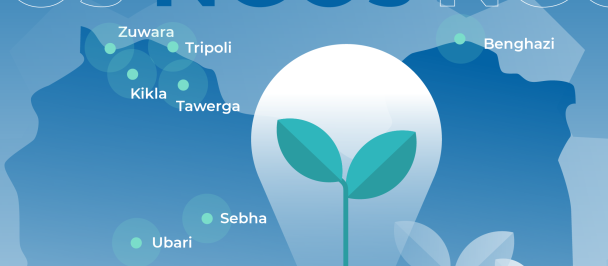Ms Mufida Saleh corrects students' exam papers in the teachers' room. Photo: ©UNDP Libya/ Abdullah Hussin
"Teachers faced many challenges in the past at this school. The teachers' room, toilets and the laboratory were in very poor condition", said Ms. Mufida Saleh, a teacher at AlGawmia AlArabia School in Zawiya West Municipality.
The conflict that affected the country disrupted the delivery of basic services and caused severe damages to many public infrastructures. Others were left without proper maintenance for a long period and could not provide a safe working environment.
AlGawmia AlArabia is a primary school located in the Zawiya West municipality. The educational facility was established in 1986. It was never maintained or renovated, causing health and safety risks for students who attend it as well as teachers and staff.
"The facility was in dire need of maintenance after a long period without any repair. It did not provide minimum learning requirements, and many parents like me were forced to move our children to schools far from our homes. This cost us a lot of time and effort, " stated Mr Alharari Wahida, a parent of a student.
"Classrooms were not providing adequate conditions as rainwater was pouring from the cracked roofs in winter. In summer, we were suffocating as the classrooms did not have windows," added Mufida.
"Residents of this area built the school by their efforts in 1986. The educational institution was in bad condition. Classrooms were not suitable for studying, and toilets were unhealthy," declared Mr. Miftah Ali Al-Shawsh, school's headmaster.
Staff and students improve performance
Students from AlGawmia AlArabia school during a test. Photo: ©UNDP Libya/ Abdullah Hussin
UNDP has supported the Municipality of Zawiya to renovate the school. The infrastructure has undergone a substantial renovation as part of the EU funded "Baladiyati" programme implemented by the United Nations Development Programme (UNDP), the Italian Development Agency (AICS), and the United Nations Children's Fund (UNICEF).
Since 2017, UNDP has partnered with the European Union (EU) to accompany public institutions, local governments, civil society, and communities to build peace and promote local economic recovery and resilience in 52 municipalities across the country, within the Strengthening Local Capacities for Resilience and Recovery Programme.
This school was identified through a participatory and conflict-sensitive approach engaging the Municipality and local stakeholders.
The renovation included essential rehabilitation to the existing building to improve the quality of the learning environment and the addition of four classrooms to cover the shortage of classes. The European Union funds the programme in Libya through the Emergency Trust Fund for Africa to improve living conditions and build resilience among vulnerable populations, including migrants, refugees, internally displaced people (IDPs), returnees and host communities.
Mr Miftah Ali Al-Shawsh in the top right oversees one of the classes in the school. Photo: ©UNDP Libya/ Abdullah Hussin
"The school became a model in every sense of the word. Old classrooms are now equipped with new windows and doors as well as lighting and air conditioning. Renovation works included the construction of a shed to protect students from the heat of the sun in summer and rain in winter," declared Miftah. It is worth mentioning the provision of toilets for students and teachers, drinking water and a fence around the school," he added.
Learning in a new environment that meets standard requirements motivates students. Teachers can now perform their duties in better conditions and provide quality education.
"The renovation has had a significant positive impact. Students are performing better," stated Mufida. The school has become one of the best schools in the region," she concluded.
Students wash their hands at AlGawmia AlArabia School. Photo: ©UNDP Libya/ Abdullah Hussin
Within the framework of the Local Peacebuilding and Resilience Programme, UNDP will continue to work hand in hand with Libyan authorities, national and international partners to promote peaceful and inclusive societies in Libya and foster economic recovery.
This renovation is part of the EU funded "Baladiyati" programme implemented by UNDP, the Italian Development Agency AICS and UNICEF. The €50 million “Recovery, Stability and Socio-economic Development Programme” currently works with 24 municipalities across Libya with the aim of improving people’s access to quality public services such as education, health, water and sanitation. The programme in Libya is funded by the European Union through the Emergency Trust Fund for Africa, to improve living conditions and build resilience among vulnerable populations, including migrants, refugees, internally displaced people (IDPs), returnees and host communities.

 Locations
Locations








